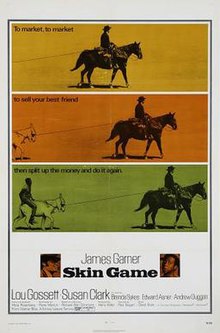Skin Game
| Skin Game | |
|---|---|
 Theatrical poster | |
| Directed by | Paul Bogart Gordon Douglas (uncredited) |
| Written by | Richard Alan Simmons (story) Peter Stone (credited as "Pierre Marton") |
| Produced by | Harry Keller |
| Starring | James Garner Lou Gossett Susan Clark Brenda Sykes Ed Asner Andrew Duggan |
| Cinematography | Fred J. Koenekamp |
| Edited by | Walter Thompson |
| Music by | David Shire |
| Distributed by | Warner Bros. |
Release date |
|
Running time | 102 minutes |
| Country | United States |
| Language | English |
Skin Game is a 1971 American independent comedy western directed by Paul Bogart and Gordon Douglas, and starring James Garner and Lou Gossett. The supporting cast features Susan Clark, Ed Asner, Andrew Duggan, Parley Baer and Royal Dano.
Plot[edit]
Quincy Drew (Garner) and Jason O'Rourke (Gossett) travel from town to town in the south of the United States during the slavery era. A flashback in the movie shows both men first meeting when Quincy sells Jason a horse that turns out to have been stolen from the local sheriff. They meet again in jail after pulling various con jobs and develop a con together in which Quincy claims to be a down-on-his-luck enslaver who is selling the only person he still enslaves, Jason. Quincy gets the bidding rolling, selling Jason, and the two later meet to split the profit. Jason was born a free man in New Jersey and is well-educated. The con is complicated by Jason being sold to a slave trader who is very savvy and intent on taking him down south to make a profit.
Cast[edit]
- James Garner as Quincy Drew / Captain Nathaniel Mountjoy
- Lou Gossett as Jason O'Rourke
- Susan Clark as Ginger / Miss Abigail Blodgett
- Brenda Sykes as Naomi, Slave
- Edward Asner as Plunkett (runaway slave hunter)
- Andrew Duggan as Howard Calloway, Plantation Owner
- Henry Jones as Sam Cutler, Slave Buyer In Fair Shake
- Neva Patterson as Mrs. Claggart
- Parley Baer as Mr. Claggart
- George Tyne as Henry P. Bonner, Man Who Bought Jason In Dirty Shame
- Royal Dano as John Brown, Abolitionist
- Pat O'Malley as William, Slave Buyer In Fair Shake
- Jason Wingreen as 2nd Speaker
- Joel Fluellen as Uncle Abram, Head Slave At Calloway Manor
- Napoleon Whiting as Ned, Calloway Cook
- Juanita Moore as Viney, Calloway Slave
- Robert Foulk as Sheriff
Production[edit]
In January 1966, Harry Keller, a producer at Universal, announced he was developing the project based on a story by Richard Alan Simmons.[1]
In March 1968, Peter Stone signed on to write the script.[2] In October 1968, Universal announced the film for the following year.[3]
In April 1969, Universal put the film on its slate for the following year. Keller would produce with Peter Stone, who wrote the script.[4]
The film did not go ahead. By September 1970, Keller announced the film would be made by James Garner's Cherokee Productions, released through Warner Bros with Burt Kennedy to direct. By December, Kennedy had dropped out and was replaced by Paul Bogart.[5]
In January 1971, Lou Gosset signed to co-star.[6]
In March, Bogart fell ill with hepatitis, and Gordon Douglas took over directing for a period of filming.[7]
Stone later claimed Garner radically changed the film's last third to give him more screen time. These changes annoyed Stone, who used a pseudonym on the film.[8]
Garner called it "a funny movie if you don't mind jokes about slavery. Paul Bogart did a masterly job."[9]
Sequel[edit]
A sequel was made three years later as a television film called Sidekicks, with Larry Hagman playing Garner's role and Gossett reprising his part.
References[edit]
- ^ Duo Slated for 5 Pictures Martin, Betty. Los Angeles Times 21 Jan 1966: c6.
- ^ MOVIE CALL SHEET: Plummer Gets Musical Lead Martin, Betty. Los Angeles Times 2 Mar 1968: 19.
- ^ Universal Lists Films for 1969 Los Angeles Times 9 Oct 1968: c24.
- ^ Universal Schedule Announced for 1970 Los Angeles Times 2 Apr 1969: h14
- ^ MOVIE CALL SHEET: Culp, Raquel 'Caulder' Stars Martin, Betty. Los Angeles Times 21 Dec 1970: i19.
- ^ MOVIE CALL SHEET: Geller Given Cinema Post Martin, Betty. Los Angeles Times 23 Jan 1971: b6.
- ^ Heflin Set for 'Revengers' Martin, Betty. Los Angeles Times 19 Mar 1971: e15.
- ^ At the Movies: After 'Carrie' Amy Irving gets the E.S.P. in 'The Fury.' Buckley, Tom. New York Times 24 Feb 1978: C8.
- ^ Garner, James; Winokur, Jon (2011). The Garner Files: A Memoir. Simon & Schuster. p. 258.
External links[edit]
- Skin Game at IMDb
- Skin Game at AllMovie
- James Garner Interview on the Charlie Rose Show
- James Garner interview at Archive of American Television - (c/o Google Video) - March 17, 1999
